Leader of Sudan’s communist party laid to rest in grand farewell
March 25, 2012 (KHARTOUM) – Thousands of people fronted by prominent opposition figures thronged on Sunday to participate in the funeral procession of the Sudanese Communist Party’s (SCP) leader, Mohamed Ibrahim Nugud, who passed away in Britain three days ago.
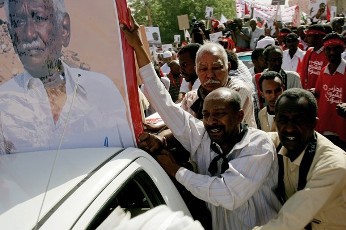
At dawn on Sunday, a British Airways flight carrying Nugud’s body landed at Khartoum Airport, from where the procession started in the presence of mournful SCP supporters who chanted slogans hailing the achievements of the deceased leader and that of the working class in Sudan.
The procession first went to Nugud’s house in Al-Fardous district in Khartoum before moving to the SCP’s headquarters in the downtown area of Khartoum 2 where party supporters and sympathizers paid their last respects.
Finally, the procession moved to Al-Farouq’s cemetery where the burial took place after the performance of relevant prayers. Police vehicles deployed heavily in and around the roads leading to the cemetery.
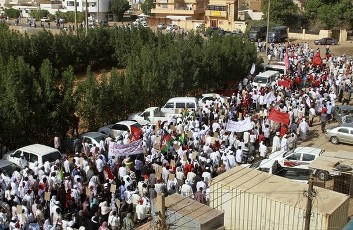
Leaders of the ruling National Congress Party (NCP), meanwhile, were conspicuously absent except for the minister of presidential affairs, Bakri Hassan Salih.
Following the burial, the SCP organized a morning ceremony in which various political figures raced to eulogize Nugud.
The SCP’s senior member, Sidiq Yousif, considered the mass participation in Nugud’s funeral procession as evidence of popular rejection to the current situation.
Al-Turabi also spoke highly of the late SCP leader, describing Nugud as a charismatic and an upright man who led his party through a period of extreme complications. The veteran Islamist called for continuing Nugud’s efforts in unifying political forces behind the goal of regime change.
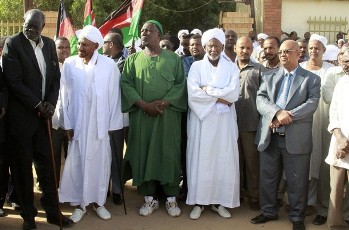
Al-Mahdi pledged that all political forces would strive to achieve equality and prevent the passing of a one-sided constitution, in a veiled reference to the draft Islamic Constitution proposed by a coalition of Islamist groups.
The ceremony was also attended by a South Sudanese delegation led by the country’s minister of higher education, science and technology, Peter Adwok Nyaba , who said that Nugud was one of the people who spent their lifetime struggling for the betterment of the former united Sudan, including the South.
Adwok called on SCP members as well as Sudanese people to support each others in order to achieve freedom and social equality.
Nugud had served as a secretary-general for the SCP since his predecessor Abdel-Khalek Mahjoub was executed by ex-president Ga’afar Nimeiri in the aftermath of the brief SCP-backed coup in 1971 along with a large number of the party’s leadership.
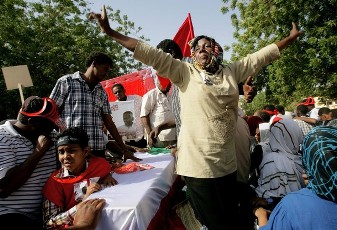
He went underground again until his hiding place was uncovered by the National Intelligence and Security Services (NISS) in 2005 as Sudan moved into a system of government that was more tolerant of opposition.
In 2009, when the SCP held its first general convention in decades, Nugud was reelected to the party’s top post. However, at the time his views largely moderated with some in the party privately attributing it to old age and deteriorating health.
A year later, Nugud ran unsuccessfully in the country’s first multi-party presidential election. By that time, the SCP chief was no longer the charismatic eloquent figure he used to be.
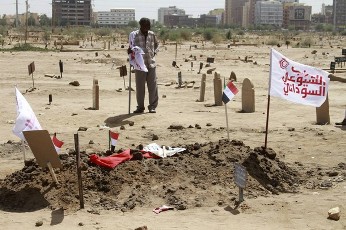
Furthermore, the collapse of the Soviet Union and the diminishing popularity of communist ideology around the world also took a toll on the party.
At one point there were discussions within the SCP on whether its name should be changed to reflect the new realities.
(ST)
